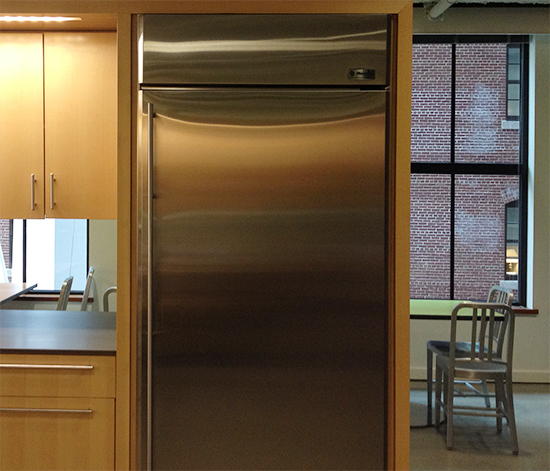
I made the mistake the other day of asking Alejandra (one of our building scientists) how to make a decision about whether or not I should get rid of an old refrigerator. My question arose when I considered the running costs of a 20 year old appliance versus the embedded energy it took to make it in the first place. This dilemma started when my wife and I embarked on what started out as a small renovation in our house. We bought the house back in 1993 and at that time installed a small kitchenette in the former barn, which is attached to the main house. This kitchenette had new appliances at the time but the rest consisted of found bits and pieces the contractor provided. Fast-forward to present day and we are upgrading this part of the house for resale and/or a boomerang suite for returning college students; we have three. The original refrigerator died several years ago. Basically, it held overflow from our main kitchen, proving useful at the holidays. We happened to have yet another refrigerator, left over from the more serious renovation of the kitchen in the main house done about 15 years ago, which got plugged in when our kitchenette fridge died and this refrigerator is the object of my inquiry. Apparently this phenomenon of keeping old fridges is common when one renovates a kitchen. Usually they make it to the garage or basement and contain a bottle or two of wine, the odd case of beer, several long forgotten mysterious frozen objects and basically gets filled up at Thanksgiving and Christmas and during the odd summer barbeque.
Our renovation will have a new under counter fridge which will more than handle the two bottles of wine and odd case of beer our old full size unit does currently and the frozen bits will get the heave. We are keeping the 20 year stove; it hasn’t seen much use and still works fine and apparently won’t use much more energy than a new one – keep the embedded energy! So, what to do with the old side-by-side sitting in the garage? Well, Alejandra and I had a little chat which resulted in a bunch of websites to investigate.
After visiting several sites I think I am off the hook because my fridge is still running and is so old, albeit it sat unused for several years. However, this was not the answer I was expecting or hoping for to guide my decision on what to do with it. A new fridge would be 40-50% more efficient than my existing unit. In theory the payback on a new unit would only be a couple of years. But, what about the embedded energy in the old unit? Some resources suggest continuing to fix it (replacing parts as they fail) even though it would continue to use more energy than a new one. I guess you keep on using that embedded energy until you die! Maybe if it is large enough you could consider being buried in it. Others resources suggest that once the fridge hits a certain age, sending it off to be recycled, be done with it and move onto a more energy efficient unit. Who knows … maybe some recycled part of it will show up in your next smart phone or car? Another option is to give it away to an organization, given that it is still working, that will clean it up and pass it on, presumably to someone more interested in first cost than running cost and won’t mind a few scratches.
There are many websites with various opinions and suggestions on what to do with aging appliances, and as one would imagine, these resources often present conflicting views. Some even consider the embedded energy in the food in your fridge and how well the fridge performs relative to what food you have to throw away! Additionally, I suspect there are numerous other websites out there to help you with almost anything you are thinking of passing on in some form or other, old TV, bicycle … one of your in-laws.
After looking at a variety of resources, which I strongly urge you to do if you are considering unloading something, the impression I got was that you keep your various appliances as long as you can and utilize the embedded energy. Once it no longer functions then the recycling route makes sense, hopefully not going directly into a landfill. Apparently, it doesn’t make much sense to upgrade purely to save energy. My decision, in the end, is to keep my old functioning side-by-side refrigerator, unplug it most of the year to save energy then plug it back in at the holidays and load it up … unless you know someone who is looking for a slightly used refrigerator only used on Sundays.
I started this inquiry with the idea that I could somehow get my head around ‘embedded energy’ and how to justify a decision about repair, recycle or pass it along on something as simple as a kitchen appliance. And as usual, nothing is as simple as one would hope. Maybe someday all products will be required to list the embedded energy not just energy consumption so we can make better decisions about where we put our money in a sustainable way. As with most things in life, I guess you make the best decision you can with the information you have and move on, hoping to tread as lightly as you can on the planet.


